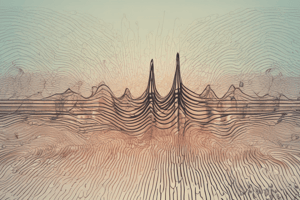Podcast
Questions and Answers
What is the first step in music production?
What is the first step in music production?
- Mastering
- Recording (correct)
- Mixing
- Composition
Which element of music production involves adjusting levels, equalization, and dynamics?
Which element of music production involves adjusting levels, equalization, and dynamics?
- Composition
- Mastering (correct)
- Recording
- Mixing
What is the foundation of every musical piece in music production?
What is the foundation of every musical piece in music production?
- Mixing
- Mastering
- Composition (correct)
- Recording
Which process in music production involves blending individual sounds to create a cohesive soundscape?
Which process in music production involves blending individual sounds to create a cohesive soundscape?
In NCERT Class 8 Science curriculum, which branch of Science covers the principles of sound?
In NCERT Class 8 Science curriculum, which branch of Science covers the principles of sound?
What type of waves are sound waves?
What type of waves are sound waves?
At what speed do sound waves travel in air at 0°C?
At what speed do sound waves travel in air at 0°C?
What can happen when sound waves from two different sources meet?
What can happen when sound waves from two different sources meet?
What is typically considered the sound source in music production?
What is typically considered the sound source in music production?
How can compression be used in music production?
How can compression be used in music production?
Study Notes
Exploring Sound: A Synergy of Music Production and NCERT Class 8 Science
Sound is an intriguing phenomenon that touches our lives in numerous ways, from the enchanting melodies of music productions to the fascinating principles of sound science in NCERT Class 8 Science curriculum. In this article, we'll delve into both aspects, exploring the art of music production and the enlightening concepts of sound in NCERT Science Class 8.
Music Production
Music production is the art of creating, recording, and refining musical compositions, in essence, transforming raw musical ideas into polished, professional-sounding tracks. Music production involves a complex interplay of different elements such as composition, recording, mixing, and mastering.
- Composition – The foundation of every musical piece, composition involves creating and arranging melodies, harmonies, and rhythms.
- Recording – Capturing audio signals is the first step in music production. This can be done using microphones, recording devices, or even specialized software.
- Mixing – Bringing together various recorded tracks, mixing is the art of blending individual sounds to create a cohesive, balanced soundscape.
- Mastering – Ensuring a track's audio quality and consistency, mastering involves adjusting levels, equalization, and dynamics to optimize the final output.
NCERT Class 8 Science – The Physics of Sound
Sound is an essential concept within the NCERT Class 8 Science curriculum, focusing on the principles behind sound waves and how they interact with our environment.
- Sound waves – Sound waves are mechanical, pressure waves that travel through air and other media. These waves are created by the vibrations of an object's surface, which then transfer energy through the surrounding medium.
- Speed of sound – Sound waves travel at varying speeds depending on the medium they're passing through. In air, sound waves travel at approximately 343 meters per second at 0°C.
- Reflection and refraction – Sound waves can be reflected off surfaces and bend as they pass through different media with different densities.
- Interference – When sound waves from two different sources meet, interference patterns can occur, creating beats, waves of constructive or destructive interference.
The Interplay of Music Production and Sound Science
Music production and sound science are intrinsically connected. The foundational principles of sound science play a critical role in music production, from how we capture and record sounds to how we mix and master them.
- Sound source – In music production, the sound source is often a musical instrument or a sound generator, such as a synthesizer.
- Sound propagation – Sound waves, like light waves, follow specific paths and can be affected by different factors, such as reflection and refraction. This knowledge can be applied to music production, enabling producers to optimize their soundscapes.
- Sound quality – By understanding the principles of sound, we can enhance the quality of our recordings and productions. For instance, we can apply techniques like equalization to adjust the frequency balance of a sound or use compression to make a sound louder and more consistent.
In conclusion, sound is not just an enchanting aspect of music production and the NCERT Class 8 Science curriculum; it's also a fascinating bridge between art and science. By embracing the principles of sound science, we can create more compelling, high-quality music productions and enhance our understanding of the world around us.
Studying That Suits You
Use AI to generate personalized quizzes and flashcards to suit your learning preferences.
Description
Delve into the realms of music production artistry and the fundamental principles of sound in NCERT Class 8 Science curriculum. Explore the intricacies of creating, recording, mixing, and mastering music tracks alongside understanding sound waves, speed, reflection, and interference in the realm of science.




